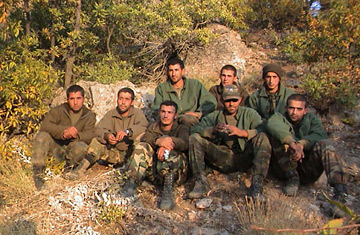
The eight Turkish soldiers held hostage by Kurdish separatists have been detained.
Forget a hero's welcome. After being held hostage by Kurdish guerrillas for two weeks and released last week after a Washington-led diplomatic effort, eight Turkish soldiers have been called traitors and cowards and detained. The eight — all in their late teens and early 20s — are being charged with disobeying orders, "suspicion of crime" and "going to a foreign country without permission," the last presumably referring to their captivity under Kurdish rebels based in north Iraq.
There was little joy at their release last week. The military is Turkey's most revered institution; every 18-year-old male is required to complete an army tour. Because Turkish soldiers are widely upheld as heroes, the former hostages were vilified by the public for not choosing death over the dishonor of capture by the enemy. With nationalist fervor at a peak, some right-wing pundits accused them of being Kurdistan Workers Party (PKK) moles. One was of Kurdish origin, others pointed out. Justice Minister Mehmet Ali Sahin said he could not "accept the fact that they went with the terrorists that night. Our soldier is prepared to die if necessary when he is protecting the country."
Although Turkey's army chief of staff Yasar Buyukanit initially said there was no evidence against the men, they were later detained under military law.
The episode lays bare the hard-line psychology of Turkey's military, a powerful political player. It does not brook public scrutiny. The hostage-taking incident, in which 200 PKK guerrillas stormed a heavily protected unit, killing 12 soldiers, is still shrouded in mystery. How did so many guerrillas manage to infiltrate a heavily guarded area? Why did it take so long to get reinforcements to the scene? How did the guerrillas and hostages leave? In their testimony, the men — all of whom were in different positions in a mountainous region near the Iraqi border — said they found themselves under fire and surrounded by PKK fighters; several said their guns jammed. According to news reports, they surrendered individually when they ran out of ammunition.
"This is the military's response to an incident that has made them uncomfortable," says political commentator Mehmet Ali Birand. "The military is giving a clear message to any soldier who finds himself in a similar situation. That message is 'Fight. Do not surrender easily'."
Recruit Irfan Beyaz's father learned of his son detention from journalists. "I can't believe this is happening," he was quoted as saying. Private Ozhan Sabanoglu's family, in the southern town of Hatay, found out from watching TV. "We have been waiting in fear and pain for days, said his father, Bahattin Sabanoglu. "We love our country. I cannot understand it. My plea to the General Staff, to the generals is give us information." A lawyer for the eight men says he will appeal the arrests. They may later stand trial, but in the eyes of a public consumed by nationalist pride, a verdict has already been delivered.
